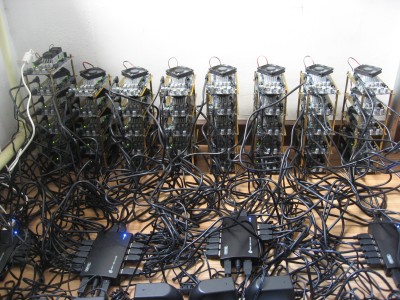File this one under “what is at stake” when we talk about the digital dualist critique. Bitcoin, the Internet’s favorite way to buy pot and donate to Ron Paul, hit an all-time high this week of around $900 to one Bitcoin (BTC). The news coverage of Bitcoin and the burgeoning array of crypto-currencies (according to the Wall Street Journal there’s also litecoin, bbqcoin, peercoin, namecoin, and feathercoin) has largely focused on the unstable valuation of the currencies and all of the terrible things people could do with their untraceable Internet money. What hasn’t been investigated however, is the idea that crypto-currencies are somehow inherently more “virtual” and thereby less susceptible to centralized control the way US dollars, Euros, or Dave & Buster’s Powercards are. Both assumptions are wrong and are undergirded by the digital dualist fallacy.
First, a few prerequisites and disclaimers. I am not a financial advisor, nor do I consider myself an economist. Therefore I’m mostly sticking to what i know about the creation of value and the organization of work. I’m not an avid or practiced user of Bitcoins, but I think that outsider perspective is more useful than detrimental. I don’t want to spend too much time going over the mechanics of mining and exchanges, so for the rest of this essay I’m going to assume the reader knows how Bitcoins are “mined” and how they are exchanged for state-backed currencies. I should also disclose that I have made a non-insignificant amount of money by totally forgetting that I bought $10-worth of bitcoins at Mt.Gox in February of 2012. I cashed all but 0.05BTC earlier this week, but don’t plan on reinvesting. I also feel like an asshole for making money doing absolutely nothing.

As my disclosure above implies, Bitcoins have very IRL implications. They can buy things that are the product of real humans’ labor and be converted (although maybe not directly) into just about every state-backed currency in existence. This is a classic example of what PJ Rey means by “The Myth of Cyberspace.” The Internet —and by extension, BItcoin— does not reside on some other plane of existence. Just like any other currency, Bitcoins are equal parts material and ephemeral; they can be affected by natural disasters, ideology, and commodities markets. They exist as heavily protected bits that are ultimately meant to be converted into atoms of sustenance and extravagance. To call Bitcoin a “virtual” currency is to fetishize its conceptual origin and distribution system. Granted, there aren’t quite as many physical representations of Bitcoins as there are other currencies, but that distinction seems to be quickly diminishing. More importantly though, Bitcoins are subject to many of the same social structures and phenomena that keep capital unevenly and unfairly distributed. Calling Bitcoins “virtual currency” is nonsensical because all currencies are virtual in that they are “collective hallucinations” about measurement of worth, and they are all equally physical because they are held, exchanged and produced in very tangible ways with equally tangible consequences.
Currency itself does not hold inherent value. Even gold, as Marx observed, does not have some natural or inherent property that makes it equal in exchange value to the products of human labor. Bitcoins are attractive to some people because Bitcoins’ measurement of value cannot be altered by a central bank or government. In other words, Bitcoins aren’t subject to value manipulation (i.e. inflation) by obscure bureaucracies with their own private interests. What I think is overlooked here, is that escaping direct control of one bureaucracy (the Federal Reserve or the Chinese government) does not mean you have separated yourself entirely from that organization or from the influence of similar bureaucracies. The fetishization of the “virtual” aspect of Bitcoins goes a long way in obscuring the possibility that Bitcoins could be manipulated. The promise of Bitcoin’s stability is strengthened by our belief that the network is immune from old social structures; that a decentralized computer network determines an isomorphic social organization.
Bitcoins came into this world always already unevenly distributed. They circulate over and through a landscape of uneven technological fluency and access to computer networks. They must be either bought with existing currencies or mined using hardware made through human labor. Electricity and silicon, Bitcoins’ constituent parts, are still controlled by private bureaucracies with their own private interests. Before those Bitcoins could exist, someone had to spend some other kind of currency to buy the computer and set it up to start mining. There’s also the cost of the Internet connection (to my knowledge, no ISP accepts Bitcoins as payment) and the opportunity costs of learning about and setting up your Bitcoin mining operation. These are not insignificant costs. The Bitcoin mining network is faster and more powerful than the top 500 supercomputers in the world. Combined.

All of this dedicated silicon is subject to labor and energy costs. Bitcoin’s valuation, conceivably, could be manipulated by the holders of the means of production. Just like the flow of dollars from the Fed, labor and energy markets are subject to organized manipulation. Its not hard to imagine a scenario where a person builds a million-dollar mining operation and selectively hordes Bitcoins to control their value relative to the cost of mining. Manipulating Bitcoins for fun and profit seems just as likely as controlling oil reserves or adjusting interest rates. Currencies are meant to be tools of mass control given that, historically, money was “whatever the king was willing to accept in taxes.” Saying you’re making a democratic currency is a lot like saying your building a non-lethal weapon: the damage might not be as severe or predictable, but its still meant for controlling and hurting people.
Bitcoins are undeniably good for masking your identity. The promises of delivering a “virtual” currency free of private interest manipulation however, do not hold up. If we’re concerned about individuals’ decreased purchasing power at the level of currency, then perhaps we should question the usefulness of currency itself. Instead of seeking out new forms of value measurement, we should reconsider the usefulness of measuring value at all. Does everything need to be assigned a specific value, or are there radically different ways of exchanging goods and services? Can our digital connections afford new ways of trucking, bartering, and exchanging such that huge numbers of people are not subject to the whims of powerful entities? I think its possible, but not with crypto-currencies.

Comments 10
else 11/25: The Collective Hallucination of Currency | John Battelle's Search Blog — November 25, 2013
[…] The Myth of Virtual Currency – Cyborgology “Calling Bitcoins ‘virtual currency’ is nonsensical because all currencies are virtual in that they are ‘collective hallucinations’ about measurement of worth, and they are all equally physical because they are held, exchanged and produced in very tangible ways with equally tangible consequences.” […]
Morning readings | Amnesia Creativa Blog — November 28, 2013
[…] you might be interested in some thoughts on The myth of virtual currency. Creative financing has done enough damage in the recent past, maybe we should avoid the same faith […]
James — December 1, 2013
You provided a vote of confidence in the current value of Bitcoin (to yourself and everyone) when it was most uncertain that doing so was wise. I wouldn't call that nothing.
The Myth of Virtual Currency » Cyborgology | Social Media Marketing 24/7 — December 14, 2013
[…] Read more here: Bitcoin GW […]
Morning readings | Creative Amnesia — January 29, 2014
[…] you might be interested in some thoughts on The myth of virtual currency. Creative financing has done enough damage in the recent past, maybe we should avoid the same faith […]
The Myth of Virtual Currency | David A Banks — March 6, 2014
[…] File this one under “what is at stake” when we talk about the digital dualist critique. Bitcoin, the Internet’s favorite way to buy pot and donate to Ron Paul, hit an all-time high this week of around $900 to one Bitcoin (BTC). The news coverage of Bitcoin and the burgeoning array of crypto-currencies (according to the Wall Street Journal there’s also litecoin, bbqcoin, peercoin,namecoin, and feathercoin) has largely focused on the unstable valuation of the currencies and all of the terrible things people could do with their untraceable Internet money. What hasn’t been investigated however, is the idea that crypto-currencies are somehow inherently more “virtual” and thereby less susceptible to centralized control the way US dollars, Euros, or Dave & Buster’s Powercards are. Both assumptions are wrong and are undergirded by the digital dualist fallacy. (more…) […]
Books are Falling Apart – Morning Readings (28 November 2013) — March 11, 2014
[…] you might be interested in some thoughts on The myth of virtual currency. Creative financing has done enough damage in the recent past, maybe we should avoid the same faith […]
Is Bitcoin a Bust? » There's Research on That — March 12, 2014
[…] others have said the currency amounts to a “Ponzi scheme” with “no store of value.” As a post from our friends at Cyborgology noted last […]